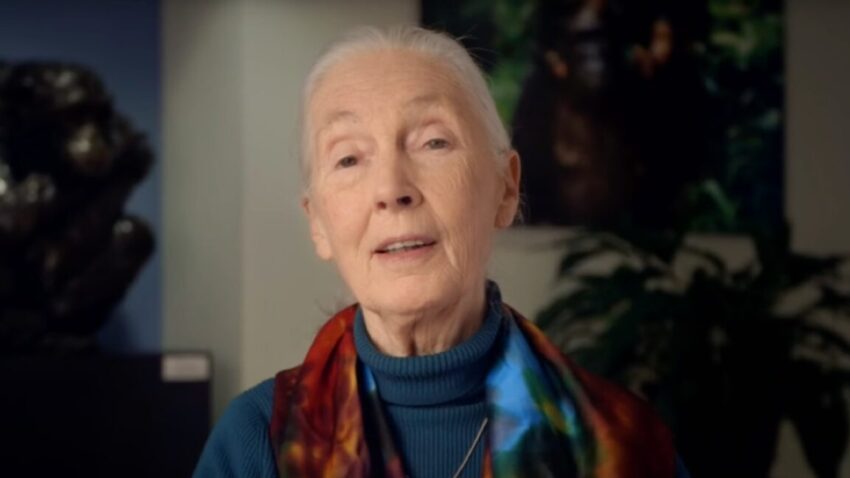
world-famous primatologist jane goodall dead at 91 Renowned primatologist Jane Goodall, whose groundbreaking research transformed our understanding of chimpanzees and their relationship with humans, has passed away at the age of 91.
world-famous primatologist jane goodall dead at 91
Life and Early Influences
Jane Goodall was born on April 3, 1934, in London, England. From an early age, she exhibited a profound love for nature and wildlife. Her fascination was so strong that her father gifted her a stuffed monkey doll, which she named Jubilee and cherished throughout her life. This early connection to animals would lay the groundwork for her future endeavors in primatology.
Goodall’s journey into the world of science began when she met paleoanthropologist Louis Leakey, who recognized her potential and hired her as a secretary at the National Museum in Nairobi, Kenya. This position allowed her to immerse herself in the scientific community and gain invaluable experience. Leakey, impressed by her enthusiasm and dedication, invited her to join him and his wife, Mary Leakey, on a fossil-hunting expedition at the Olduvai Gorge. This experience solidified her commitment to studying primates and understanding their behaviors.
Groundbreaking Research in Gombe
In 1960, at the age of 26, Goodall embarked on her most significant research project in the Gombe Stream National Park in Tanzania. With minimal resources and no formal scientific training, she began her observations of wild chimpanzees. Her approach was revolutionary; rather than maintaining a distance, she immersed herself in their habitat, spending hours observing their social interactions, feeding habits, and emotional expressions.
Goodall’s findings challenged the prevailing views of the time. She discovered that chimpanzees are not only capable of using tools—such as using sticks to extract termites from mounds—but also exhibit complex social behaviors, including cooperation, conflict, and even emotions akin to those of humans. This research fundamentally altered the scientific community’s understanding of primates and their cognitive abilities.
Key Discoveries and Contributions
Among her most notable discoveries was the observation of tool use among chimpanzees, which had previously been thought to be a uniquely human trait. Goodall documented how chimpanzees would modify twigs to fish for termites, demonstrating their ability to manipulate their environment in sophisticated ways. This revelation prompted a reevaluation of the cognitive capabilities of non-human animals and raised important questions about the nature of intelligence and the evolutionary connection between humans and primates.
Goodall’s research also highlighted the emotional depth of chimpanzees. She observed behaviors such as grief, joy, and empathy, which further blurred the lines between human and animal experiences. Her work emphasized the importance of understanding and respecting the emotional lives of all living beings, a principle that became central to her advocacy for conservation and animal welfare.
Advocacy and Educational Initiatives
Beyond her research, Goodall was deeply committed to conservation and education. She founded the Jane Goodall Institute (JGI) in 1977, which focuses on wildlife research, education, and conservation efforts. The institute has played a crucial role in promoting sustainable practices and protecting chimpanzees and their habitats. Goodall’s passion for empowering young people to engage in conservation and humanitarian projects has inspired countless individuals worldwide.
Goodall led numerous educational initiatives aimed at raising awareness about the plight of both wild and captive chimpanzees. She believed that educating the next generation was essential for fostering a sense of responsibility toward the environment and all living creatures. Her programs often included hands-on experiences, allowing students to connect with nature and understand the importance of biodiversity.
Global Impact and Recognition
Throughout her career, Goodall received numerous accolades for her contributions to science and conservation. She was named a United Nations Messenger of Peace in 2002, recognizing her efforts to promote environmental awareness and animal welfare on a global scale. Her work has been featured in various documentaries, books, and public speaking engagements, further amplifying her message and reaching millions of people.
Goodall’s influence extended beyond the scientific community; she became a cultural icon, representing the intersection of science, conservation, and activism. Her ability to communicate complex scientific concepts in an accessible manner has made her a beloved figure among both scientists and the general public. She has authored over 30 books, including her famous autobiography, “In the Shadow of Man,” which chronicles her experiences in Gombe and her reflections on the relationship between humans and animals.
Legacy and Continuing Influence
Jane Goodall’s legacy is profound and multifaceted. Her pioneering research laid the foundation for modern primatology and has inspired generations of scientists to explore the complexities of animal behavior. Her emphasis on empathy and respect for all living beings has resonated with people across cultures, fostering a greater understanding of the interconnectedness of life on Earth.
The Jane Goodall Institute continues to carry forward her vision, focusing on innovative conservation strategies and community-centered approaches. The institute’s programs emphasize the importance of local involvement in conservation efforts, recognizing that sustainable practices must be rooted in the communities that share habitats with wildlife.
Reactions to Goodall’s Passing
The news of Jane Goodall’s passing has elicited an outpouring of tributes from around the world. Many prominent figures in science, conservation, and activism have expressed their condolences and shared their admiration for her work. The Jane Goodall Institute released a statement highlighting her passion for empowering young people and her revolutionary contributions to science. They noted, “Jane was always guided by her fascination with the mysteries of evolution, and her staunch belief in the fundamental need to respect all forms of life on Earth.”
Goodall’s impact on the field of primatology and conservation is immeasurable. Her dedication to understanding and protecting chimpanzees has not only changed the course of scientific research but has also fostered a global movement toward greater environmental awareness and ethical treatment of animals. As we reflect on her life and contributions, it is clear that her legacy will continue to inspire future generations to advocate for the protection of our planet and its inhabitants.
Conclusion
Jane Goodall’s life was a testament to the power of curiosity, compassion, and commitment to making the world a better place. Her groundbreaking research, advocacy for conservation, and dedication to education have left an indelible mark on the world. As we mourn her passing, we also celebrate her extraordinary contributions and the lasting impact she has had on science, conservation, and humanity.
Source: Original report
Was this helpful?
Last Modified: October 2, 2025 at 10:37 pm
4 views















